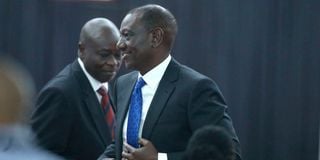President Ruto made no mistake in dropping Rigathi Gachagua

President William Ruto and former deputy president Rigathi Gachagua.
The removal of Rigathi Gachagua as Deputy President was received differently across the country, depending on one's political affiliation. Supporters argued it was long overdue, while there are those who viewed it as a political betrayal. However, from my perspective, President William Ruto’s actions are not new in Kenya's political landscape. He is not the first leader to sideline key political allies.
Although we are currently governed by the 2010 Constitution, political dynamics in Kenya have largely remained unchanged. The key players stay the same, and the removal of a DP similar to the role of vice-president under the old constitution has historically been a recurring feature—from Jomo Kenyatta’s government through to the current one.
For instance, when colonial rule ended, the British reportedly wanted Jaramogi Oginga Odinga to lead the country. However, Odinga refused, arguing that Kenya could not achieve true freedom with Jomo still imprisoned. Despite his sacrifices, he was frustrated and resigned as vice-president after serving for only a year and four months. Following his resignation, Joseph Murumbi took over but also resigned after four months due to frustration and the assassination of his friend Pio Gama Pinto. This trend of vice-presidents being sidelined continued under subsequent presidents, including Daniel Moi and Mwai Kibaki.
Vote of no confidence
Moi had Josphat Karanja who served for a year then resigned to avoid a vote of no confidence. Then came George Saitoti who remains the longest-serving VP. At one point, Moi stayed without a VP for 14 months. He ended his tenure with Musalia Mudavadi who served for just two months.
Moody Awori served one term with Mwai Kibaki and this was after the passing on of Kijana Wamalwa. Reasons for Awori’s removal in Kibaki’s second term remain unclear. He picked Kalonzo Musyoka thereafter. Similarly, while Uhuru Kenyatta did not directly engineer the removal of his deputy, William Ruto, the two had frequent disagreements, and Ruto was subjected to disrespect by his juniors, all under Uhuru’s watch.
Rather than focusing on ethnic divisions to criticise the President, it is time for Kenya to conduct a deeper reflection and seek a solution to the recurring issue of deputy-presidents being sidelined. We must ask whether it is the presidents who are unwilling to share power with their deputies or if it is the deputies who, for political reasons, seek to outshine their bosses. For the stability of any administration, the DP should be someone committed to supporting the president’s agenda and not using the position to advance their own political ambitions.
National politics
This issue is not just confined to national politics; it also affects county governments. There are always fights between governors and their deputies. When there is infighting, it is the citizens who suffer due to poor service delivery.
Interestingly, it seems that only in Kenya do DPs overshadow their bosses—many Kenyans cannot name the DPs of neighbouring countries.
Therefore, instead of ethnic groups rallying together to criticise President Ruto over Gachagua’s removal, it is crucial that we come together as a nation to address the root causes of these political tensions. We need to find a solution that ensures we do not continue witnessing public spats between a president and his deputy, which not only harms service delivery but also tarnishes Kenya’s reputation on the global stage.
By enshrining the role of DP in the Constitution to cure the incessant dismissal of VPs under the old constitution, the drafters of the 2010 Constitution might have unintentionally empowered the DPs to the point where some may view the role as co-presidency. If this is the case, it could explain the frequent friction between presidents and their deputies.
However, deputies must understand that their role is to assist the president, not to undermine or overshadow them. While political ambition is natural, it can be politically suicidal to allow it to cloud one’s judgment to the extent that the boss feels threatened.
In the case of President Ruto, he promised during his campaign that he would never subject his deputy to the same challenges he faced. His decision to sideline Gachagua may have been unfortunate but necessary. When Kithure Kindiki was sworn in as DP, the President acknowledged the difficulty of being in power alone and emphasised the need for support. Thus, it is wrong to crucify him for making the decisions he made.
Mr Muthama is a commissioner with the Parliamentary Service Commission. @nduyamuthama.


